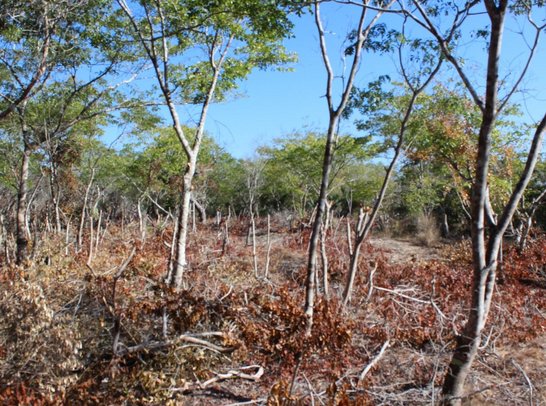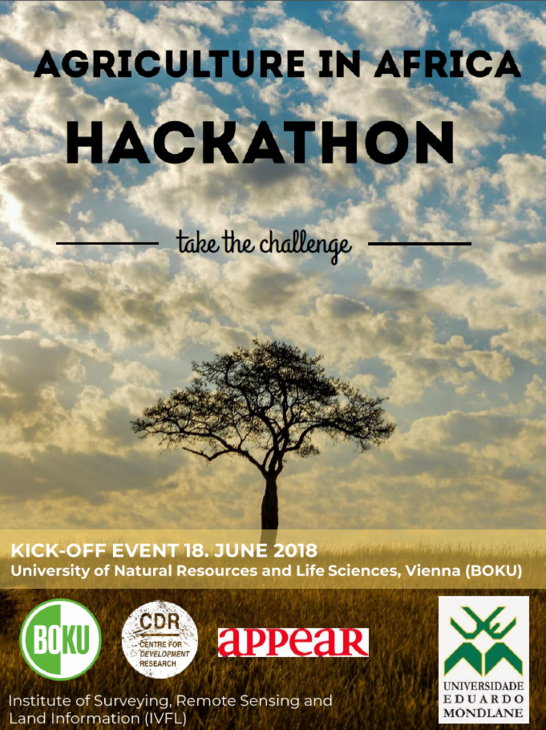Strengthening remote sensing data processing and interpretation capacities for operational use in agricultural system monitoring | EO4Africa

Project coordinator: Dr. Francesco Vuolo
Coordinating institution: University of Natural Resources and Life Sciences, Vienna
Partner institution: Universidade Eduardo Mondlane / ESUDER Escola Superior de Desenvolvimento Rural (Sosdito Mananze, MSc.)
Partner Country: Mozambique
Project duration: 15th of June 2017 – 30th of November 2020
Abstract
Food security, agricultural risk assessment and sustainable crop production are top priorities and challenging societal issues in Mozambique (FAO, Country Programming Framework 2016-2020). Agriculture is the principal source of income in rural areas, accommodating roughly 70% of the nation’s population. As other countries in East Africa, Mozambique is highly vulnerable to extreme weather events (droughts and floods) and erratic and unpredictable precipitation patterns. This negatively contributes to uncertainties in crop production and often limits access to food causing malnutrition of children. In this context, analytical tools to timely monitor crop production, risk and vulnerability are strongly needed by governmental agencies (national to regional) as well as various actors in the food management and supply chain. Timely and accurate knowledge of land and water resources and use are essential in understanding how climate variability affects regional crop production and for supporting the allocation of resources for medium and long-term planning.
Agricultural monitoring systems rely on timely, objective and cost-efficient information to support the assessment of agricultural production at relatively fine scale over large areas. A well implemented information stream can produce essential datasets such as crop acreage, crop types, crop conditions and crop production. Considerable efforts have been made in the past years to obtain this information in a cost-effective, precise and reliable way. The use of Earth Observation (EO) satellite imagery has been essential thanks to its wide and frequent coverage of global land surfaces. An increased up-take of EO data can be expected for the coming years as more open-source, high spatial resolution satellite data become available, such as Sentinel-2 satellite data from the European Copernicus programme.
Objectives
The overall objective of EO4Africa is to strengthen the institutional capacities for mapping and monitoring agricultural areas in Mozambique. EO4Africa develops local skills and strengthens research, management and networking capacities to:
1. routinely mapping crop conditions;
2. detecting crop growing anomalies;
3. providing timely crop statistics on a permanent basis;
4. developing capacities for better implementation of existing and forthcoming national policies supporting the implementation of the Sustainable Development Goals;
5. collaborating with international humanitarian organisations (e.g. WFP).
Supported by the APPEAR programme, EO4Africa is jointly implemented by the Institute of Surveying, Remote Sensing & Land Information (IVFL) at the University of Natural Resources and Life Sciences, Vienna (BOKU) and by the Escola Superior de Desenvolvimento Rural (ESUDER) based in Vilanculo (Inhambane province, Mozambique). To ensure success, positive experiences from similar countries will be leveraged. First implementations will be set up in the Inhambane province starting in June 2017. Crop monitoring capacities will be consolidated, demonstrated and extended to a neighbour region (Sofala or Manica province) during 2018 and 2019.
Outcomes and impact
The project provides research tools, (big) data sets, skills and capacities to better cope with natural resource assessment, allocation and control. It jointly develops analytical tools to increase transparency and efficiency in the decision-making processes for food management and provision. To increase regional impact, the project involves local stakeholders such as the provincial agency for food aid (local staff will be trained), the agricultural extension services and one large-scale food producer (Join Aid Management –JAM). To maximize international visibility and to contribute to climate change studies, the project also supports the integration of data and local capacities into global CO2 networks such as FLUXNET, CarboAfrica and the Trans-African HydroMeteorological Observatory (TAHMO). Furthermore, country staff of the World Food Programme (WFP) will participate in the training. Finally, the project paves the way for the local partners to get involved in larger scale initiatives such as Copernicus (GMES & Africa initiative), Word Bank and ESA for development.

